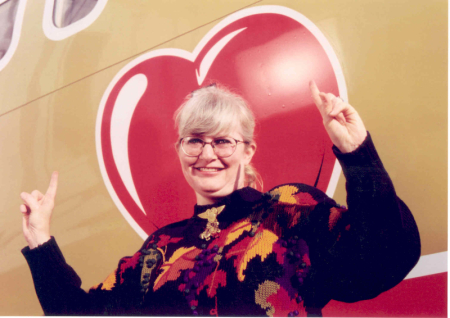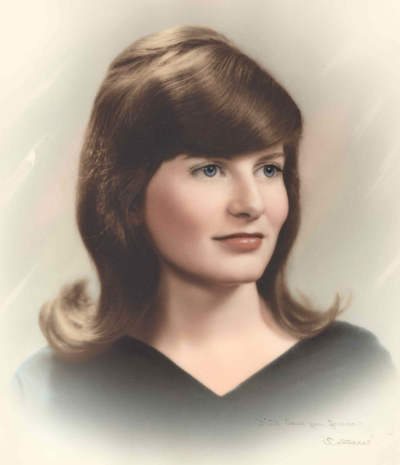Southwest Airlines: How faith, servant leadership of Colleen Barrett led to company's massive success

The airline industry suffered a major blow in the wake of Sept. 11, 2001.
Faced with a massive financial crisis due to canceled flights, shuttered airports, and increased expenditures for security, several prominent airlines were forced to declare bankruptcy. Thousands of employees were laid off and labor contracts re-negotiated as airlines struggled to make ends meet.
But Southwest Airlines responded differently.
The first airline to advertise following the terrorist attacks, Southwest replaced its normally humorous advertising with a message of hope and patriotism. Featuring the voice of then-President Colleen Barrett, the advertisement reassured Americans that the company's 32,000 employees are "pledging our allegiance to America. Nothing will keep our country or Southwest from moving ahead."
“Colleen wanted to boldly say that our first priority was securing jobs for the people who worked for the airline at the time,” Southwest Airlines Senior Vice President Linda Rutherford told The Christian Post.
Incredibly, Southwest Airlines made a profit in the fourth quarter of 2001 — without laying off a single employee or cutting their pay.
“That is in stark contrast to other airlines that immediately opted to lay off people; we opted to keep our obligations and renegotiate our aircraft contracts,” Rutherford said. “Her interest, first and foremost, was serving our employees. The way she navigated that tragic event was a pivotal moment in the airline industry and just one example of her incredible leadership.”
Under Barrett’s leadership, Southwest became one of the country’s largest and most profitable major airlines. Today, the company has over 63,000 employees with 750 airplanes flying passengers on 4,100 flights every day. It’s also been recognized for 24-straight years as one of FORTUNE magazine’s Most Admired Companies.
A devout Christian, Barrett’s leadership style was based on the Golden Rule: Treat others the way you want to be treated. A fierce advocate of servant leadership, she was committed to putting her employees first, as commanded by Jesus in John 13:1–20: “I have set you an example that you should do as I have done for you. Very truly I tell you, no servant is greater than his master, nor is a messenger greater than the one who sent him.”

Barrett explained in an interview that people often ask her the secret of Southwest Airlines' success. "We tell them," she said, "that it's how we treat our people. And they say, 'No, really, what is it?'"
Although she retired from Southwest in 2008, her others-first mindset and dedication to service directly contributed to the company’s massive success and continues to drive the philosophy and culture today.
Rutherford explained that thanks to Barrett's example, the idea of love and the Golden Rule “very much became a cornerstone and foundational to the corporate culture of Southwest."
“It began to build and grow into what the company represents today,” she said. “She was a big proponent that the Golden Rule and the idea of servant leadership be so baked into who we are that it actually became part of our performance management.”
“She is a strong woman who is very convicted in her beliefs and focused on doing the right thing,” Rutherford added. “She’s the kind of person who, when you’re in their sphere, you absolutely want to exceed their expectations. You don't want to disappoint them.”
Affectionately known as the “Mom” to her employees, Barrett joined the Southwest Airlines Company in 1978 as a corporate secretary, eventually rising through the ranks to become the company's president and COO. Working alongside her mentor and company co-founder Herb Kelleher, Barrett stressed employee satisfaction followed by the needs of the passenger. An engaged, motivated workforce, she believed, would lead toward a positive growth for the company.
“Colleen wanted Southwest to be a safe, secure, productive place for employees,” Rutherford said. “In turn, employees do their best work. She focused on preserving jobs, taking care of our people, and making sure that the organization was healthy.”
“Colleen made you feel very important — just as important as making a smart decision on a contract, or negotiating a deal with an outside vendor or being responsive to immediate inquiry,” she continued.
Recognized as one of Forbes’ “Most Powerful Women” in 2004 and 2005 and a top-ranked woman executive in the airline industry, Barrett also pioneered Southwest’s exemplary approach to customer service.
“We try to provide more value rather than nickel and dime the customers, which speaks to the legacy that she helped set up,” Rutherford said. “That legacy was, ‘let's be a difference maker in the air travel business. We don't have to be a tedious part of the journey. We can actually be a hopeful, joyful part of the journey.’”
“We exist to connect people to what's important in their lives and we do that with friendly, reliable, and low-cost air travel,” she continued. “Those are principles instilled by Colleen that have withstood the test of time.”
But it was Barrett’s dedication to servant leadership and her ability to lead through adversity that directly contributed to Southwest’s success, Rutherford contended, adding: “Back in the day, those might have been called ‘soft skills,’ but they truly are what makes Southwest a different kind of airline.”
“What she injected into the organization that still exists today are just the humanity and the caring and the heart,” she said. “Taking time to appreciate one another, taking time to recognize a job well done, taking time to acknowledge an employee's life event. Those are the things that she preached to us and continues to impact the company today.”





















